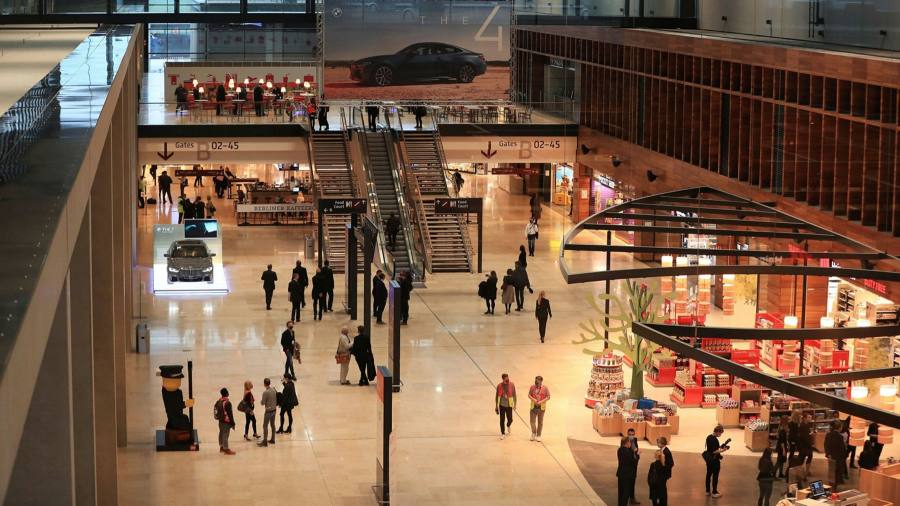Last autumn, in the early months of the Covid pandemic, the flash new Berlin Brandenburg Airport opened its doors — 10 years late and at an overall cost of at least €7bn, two and a half times the original budget.
Widely seen as a national embarrassment, the state-run 30-year airport project is not an isolated case in Germany’s transport infrastructure record. Construction of Stuttgart’s new railway station, now the subject of fraud allegations, has cost €8.2bn, up from an initial €2.5bn.
For the FDP, the “amber” member of Germany’s incoming traffic light coalition government, such examples highlight the shortcomings of entrusting large-scale infrastructure projects to public sector managers and budgets.
As the administration prepares to take office this week, the 176-page coalition agreement that underpins it bears the clear influence of the FDP, particularly in the section on “future investments and sustainable financing”.
Tempering the spending instincts of the dominant SPD and the Greens, there is insistence that the country’s “debt brake”, which limits Germany’s structural deficit, be maintained, even as the coalition promises “a decade of investment”. The plan includes “unprecedented additional spending” thanks in part to a pledge to “activate more private capital for transformational projects”.
Specialist infrastructure operators, the country’s cash-rich insurers and the capital markets, re-energised by a hoped-for EU-wide Capital Markets Union, will all be essential providers of that private capital, according to senior officials.
One key paragraph, inserted at the insistence of the FDP, advocates the expansion of public-private partnerships, a key plank of UK infrastructure renewal since the 1990s — though less so recently. Data from Britain’s National Audit Office show volumes peaked in 2007 at £8.6bn, when more than 60 deals were struck, dwindling to virtually nothing in recent years.
German enthusiasm for PPP has shown a similar pattern of decline, although the numbers are much smaller — at the 2007 peak, 38 deals worth a combined €1.5bn were done, according to Partnerschaft Deutschland, an advisory group. In 2019, the last year for which data are available, only three deals were done, worth just €66m.
Those patterns reflect a mixed verdict on the effectiveness of PPP. The UK NAO has been critical of the value for money achieved on an array of projects since the 1990s. German advocates, such as the BDI employers federation, point to benefits: a world-leading swiftly-upgraded Autobahn network would not have been possible without private sector partnership. The price paid — by drivers via toll roads — divides popular opinion.
The new coalition agreement is clear that private sector money should be used to support a wide variety of investment priorities — environmental protection, digitalisation, education, research and infrastructure.
The tension, by design, is between a government that wants to minimise cost and a private sector that is keen to maximise returns. That is not acknowledged in the coalition agreement, though some figures in the new administration are clearly sceptical of private sector money, especially given the ultra-low interest rates on German government debt. “When we can raise funds at zero, why should we pay money to the private sector?” asks one.
Officials’ view of private money as relatively expensive debt finance is wrong-headed, says one top insurance executive: for one thing, private sector money should bring with it operating expertise; for another, cash is best employed not as debt but as equity, protected by a state-backed first-loss buffer, to help control the kind of cost overruns that scuppered the Berlin airport budget.
With or without PPP, the new government has other strategies to escape the restrictions of the debt brake. KFW, the existing development bank, for example, looks set to be recapitalised — a process that should not add to government debt. The bank then could help finance large transformational projects. The agreement suggests a similar approach to supercharging the financing wherewithal of the state-owned Deutsche Bahn and state property agency Bima.
As Olaf Scholz, the incoming SPD chancellor, thrashes out the right balance to strike with his new FDP finance minister Christian Lindner, they should perhaps look skywards. Even in Covid times, enough aircraft are flying overhead towards Brandenburg Airport to provide a regular reminder of how not to do it.
patrick.jenkins@ft.com
Stay connected with us on social media platform for instant update click here to join our Twitter, & Facebook
We are now on Telegram. Click here to join our channel (@TechiUpdate) and stay updated with the latest Technology headlines.
For all the latest Business News Click Here
For the latest news and updates, follow us on Google News.

